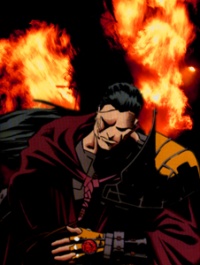
|
| Sith Bloodfyre-Tarentae
|
|
Shaevalis Prime
|
|
68 BBY (age 112)
|
|
N/A
|
|
Shaevalian
|
|
Male
|
|
1.854 Meters
|
|
108.86 Kilograms
|
|
Black
|
|
Blue
|
|
|
- Dalthid
- Kaiann
- Arania Lawakiro
|
|
|
|
|
|
|
|
|
|
|
|
|
|
|
|
|
|
|
|
756
|
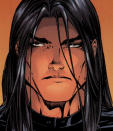
- "Once we realize that imperfect understanding is the Human condition there is no shame in being wrong, only in failing to correct our mistakes."
- ―George Soros (1930 AD - )
As one of the Tarentae, Sith Bloodfyre stands as a paragon of ascension and power within Tarentum, a Clan he has served in exclusively. While the Sith Master is held in great respect by some, and yet reviled by others for past choices, many within the Brotherhood recognize the man's name instantly. Having served in various positions, ranging first from Aedile of then-House Gladius of Tarentum and Quaestor, eventually to Proconsul and then Consul of Tarentum, to serving in the Chamber of Justice, or on the Dark Council itself as the last of the Sith High Warriors, nearly every facet of the Brotherhood has been affected by, or has directly affected, the Sith Master.
The Boy
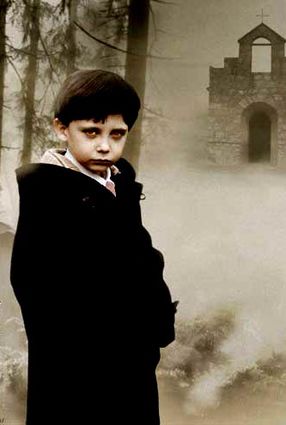
- "It is a wise father that knows his own child."
- ―William Shakespeare (1564 - 1616 AD)
So much of what I was born to, and what I had done among my people has been forgotten. Time is a river, and it moves swiftly. Without others along for the ride to help you remember, you will forget. Without taking snapshots of victory as well as defeat, so that you might live to be greater, you are doomed to repeat your past mistakes. Become more, or be doomed to relive your failures. So it is with others. So it is with me.
My first life, as I choose to remember it, was a lie.
Early Childhood (68 - 50 BBY)
Sith Bloodfyre does not exist.
This identity was forged while a refugee fled his people. Yet, it became everything a faceless youth had ever dreamt of, or envisioned. While a great majority of the tales surrounding him are half-truths and different spins on reality, there truly is no such person that was born on Shaevalis Prime under the name of Sith Bloodfyre.
He was born Arikan Sol, the sole offspring of the shogunate ruler of an outlandish people beyond the known territories of space. In the unknown realms of Wildspace, the Shaevalis system is ruled by the Grand General Evandris Sol. Evandris was the most recent head of the military government of both the Shaevalis system and Shaevalian people. Arikan was born into opulence and nobility, but he was also born into hatred and murder. His mother, Mareeta van Kaynen, had indeed married the Grand General, had previously been a daughter of a noble house, and had died in childbirth. It caused a fracture in the Sol household from the very moment of the boy's birth. The trauma of the birth was not solely upon the mother, and exacted a toll upon the boy; Arikan grew up as a very frail boy, needing constant attention.
After the birth and subsequent funeral rites for Mareeta, Evandris retreated into his role, and Arikan was left in the able hands of various wet nurses and nannies. The sickly boy had no physical contact with his father growing up. In fact, well through his twentieth year, Arikan had only laid eyes on his father on perhaps a handful of occasions. And, for the long-lived Shaevalians, this coldness certainly had a profound effect on the youth. Perhaps partly due to his poor health, or his father's neglect, Arikan grew into a very dark, hate-filled individual. Where Shaevalian youth were certainly aggressive and warlike, often exhibiting such traits at the onset of adolescence (generally the mid-20s to early-30s in standard years), Arikan began to exhibit aggression, hate, and dark emotions many years earlier than expected.
Where normal youth had nurses or guardians assigned to them through Shaevalian puberty, Arikan had menaced all who would serve in the Grand General's household. Eventually, Evandris Sol had to seek outside help. It came in the form of one of the Soreihan -- a Shaevalian term meaning “man of fire in their blood.” (This would aptly be translated as “Force-user.”) Publicly, the Soreihan were the guardians of the Imperial family, which family were in turn served by the shogunate Grand Generals. The truth was that the Soreihan served the Grand Generals, and kept the Imperial family locked away from interfering with the public.
To deal with the trouble of young Arikan, Evandris called for the assistance of one hailed as “Menh the Master,” a powerful Soreihan of many years service. Menh was not unkind, but neither was he gentle or caring. Indeed, Menh often assigned difficult tasks to his young ward, designed to train and focus the mind and inner demons of the young Arikan to better ends. Arikan eventually developed a trusting bond with his mentor, and as the two deepened into something akin to master and apprentice, a hidden truth became very obvious -- Arikan was a Force-user. Among the Shaevalians, however, the Soreihan could not actively seek out and recruit new additions. The only way they could accept others was through ritual abandonment and donation of children, and this could never come from the Grand General.
Though Menh would never announce the hidden truth to the boy's father, he began to train Arikan in focusing techniques and methods to enhance his physical prowess. Shaevalians are a hearty people, but the circumstances of Arikan’s birth left him smaller and weaker than his genetic brethren. With Menh's training, though, Arikan made great strides physically, and became a closer match for others of his kind. As the boy's training progressed, the inner demons that Menh sensed in Arikan seemed to retreat. Arikan then began training as a warrior, in multiple forms of combat favored by Shaevalians. Swordplay, archery and grappling became some of the boy's favored forms. In time, it even began to attract the attention of the elder Sol, and it seemed as though Evandris might finally acknowledge and accept a relationship with his son.
Teen Years (50 - 10 BBY)
As Arikan aged and trained under Menh, his powers rumbled beneath the surface like some sort of cosmic quake waiting to rock the heavens and the earth in turn. By the boy's twenty-fifth birthday, Arikan was exhibiting great potential as a Force-user. Evandris had decided it was time for his son to become a man, and decreed -- through Menh as mouthpiece -- that Arikan would enroll at the Tohran Academy. Disillusioned with his father and enraged by having the choice forced on him, Arikan found Evandris attending a gathering of allies in his home. The son challenged his father to a duel, claiming that he would earn his freedom from the Sol line by killing Evandris. Evandris mocked his son openly, blaming the outburst on the fiery passion of Shaevalian males, and told the boy that he would only be a real challenge once he had completed his military schooling.
Arikan left the family home and traveled to the isolated fortress of the Soreihan, intending to leave his family behind forever and join the brotherhood of his mentor. Evandris had been apprised of the situation by Menh, and the Grand General arrived with an armed escort of nearly 100 men, all of the Grand General’s personal guard. Evandris decided it was time to show Arikan who was father, and instruct the disobedient boy on the rightful place of a son. Arikan intended to resist, but the will of his father was too great, and Menh was -- above all else -- a servant of Shaevalis; the Soreihan elder turned on the boy and dispatched him, binding him in chains. From that bitter moment onward, the young Sol knew he could never trust his people again.
For weeks, the boy plotted to kill the Grand General after being returned to their home estate. For unknown reasons, Menh returned to the Sol estate and managed to stop the plotting boy. Arikan would never rebuild his trust in his former mentor, but the elder’s presence was enough to sway any further plotting. Instead, Arikan began preparing for the entrance exams and physical tests that would come in short time. He wouldn’t be able to kill his father, but by entering the Academy, Arikan would at least have physical distance between them to soothe his troubled soul.
At the Academy, the other students initially despised the son of their shogunate leader. They were incensed by Arikan -- who seemed disinterested in the entire affair -- seemingly “gifted to attend,” where other boys would have to work incredibly hard to attain such an admission. The truth of the matter, that Arikan had been tested perhaps even more strenuously, was never given second thoughts; the others had already passed judgment. Arikan and his fellow students often engaged in contests and disputes to challenge Sol's place within the academy, and sought on many occasions to create incidents in which Arikan would have been expelled from the academy.
As it became starkly clear that Arikan was being targeted due to his father, his impulsive reaction was to play into the idea of gaining revenge on his father through being expelled. However, as time passed, he began to see his father less the real enemy, and turned those attentions to the other students of the academy. It would be his ultimate pride and reward to see graduation with top honors despite all efforts from his peers. The fighting between Arikan and the other students halted after such an epiphany, even though the other students still attempted to goad him into any kind of altercation worthy of expulsion. With passing time, however, some of the students began to admire the tenacity and drive that Sol possessed, and eventually, Arikan won over some of his peers as truest of allies and friends.
Eventually, Arikan became one of the more respected and social members of the academy, and indeed graduated with top honors in his class of graduates. He was commissioned upon graduation, and served in a number of positions that culminated in a very distinguished, but short-lived career as the Commander of the Shaevani Battalion, a portion of the Shaevalian military that Evandris had commanded himself at one point many years before. During his last days leading the Battalion, Arikan's left arm was hacked off, and he was nearly killed except for an outburst of rage that called upon the Force -- the Dark Side to be exact -- which obliterated his foes and even some of his own troops. Arikan was removed from active duty immediately following the closure of the battle, under the pretense of allowing his wounds to heal, but the forgotten Menh had sensed ripples at the time of Arikan’s injuries, and had warned the elder Sol about it, as well.
Following a surgery which replaced Arikan's lost arm with a cybernetic one, the young man left the home of his father and the world of his people. The reasons for the departure were never known outside of the family home, if even Evandris knew the reason. Menh left the Grand General's home and returned to the Soreihan with the disappearance of the boy he had trained, and Evandris himself reacted to the situation as though his son had died of his battle wounds. The name of Arikan Sol was not spoken on the world of Shaevalis Prime again.
The Man
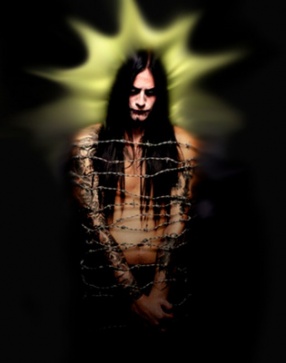
- "I shall seize Fate by the throat; it shall certainly not bend and crush me completely."
- ―Ludwig van Beethoven (1770 - 1827 AD)
Within the realms of Eos, I found tutelage and experience. Kumba, the last of the Dark Prophets of the bygone age, was Headmaster. Kumba had been of Tarentum, though I was not aware of this initially. Perhaps it was merely a connection of the Force. With my initial training in the Brotherhood commencing, I was forced to make a choice, to find a place I would call home. That choice was defined by the Order I chose to reside within, the Krath. With such a choice, I found Tarentum awaiting, and House Gladius became my abode.
The Dark Brotherhood (9 - 13 ABY)
Sith Bloodfyre first came to the attention of the Brotherhood many years after the disappearance of Arikan Sol -- around 9 or 10 ABY. Though he appeared to be physically young, Bloodfyre's cold intellect suggested that he had lived a great many years beyond youth. The Shaevalian quickly made his way through the initial training of the Shadow Academy under Headmaster Kumba, the last of the Dark Prophets of old. Once finished with his initial training at the Shadow Academy, Sith joined House Gladius of Clan Tarentum as a member of the Krath Order. Bloodfyre completed additional training both back at the Shadow Academy and within Gladius itself, then joined with several others of Gladius in forming the once-infamous Phyle, the Mystics of the Black Arts.
In those days, the Mystics Phyle was feared and respected among the Krath Order. First among the nicknamed “insane ones” were Ciara Tearnan, the Phyle-dubbed "Queen of the Mystics"; Aari Nikus; Jaya Cypher; Kryndath Del'Chanar; Kidouses; Deathlord; Sith Bloodfyre, himself; and finally, Telona Murrage. The reputation following the Mystics was one of cunning insanity, a reputation that spread both within Tarentum at first, and eventually throughout the rest of the Brotherhood. The Mystics were not inane and juvenile, but instead, were thought to be profoundly and incurably mad, twisted and truly evil -- a cursed form of madness that brought with it a misunderstood and dreaded darkness. Despite such madness, however, the Phyle was known to be insightful in regards to the Force, and a powerful detachment bearing some of the Krath Order's finest.
Advancement within the Krath Order and Tarentum itself came fast for Sith; in relatively little time, he was jaunted through the Journeyman ranks to be elevated to the standing of Dark Jedi Knight, and Aedile of Gladius under Aari Nikus, and then shortly after to the rank of Krath Priest and Quaestor of Gladius upon Aari's departure. Sith made a name for himself as a dedicated leader, and as one of the respected members of his Order. During one particular conflict involving the Krath, Sith proved himself to the Krath High Priestess at the time, and he was elevated to the rank of Archpriest. For more than a year, Sith Bloodfyre led House Gladius, and the House helped to maintain the reputation of Tarentum that it had enjoyed throughout the ages.
At the time, Tarentum was led by Ciara Tearnan, an ally of Bloodfyre's from the Mystics, and a respected veteran of Clan Tarentum. With her Proconsul Proton, the Clan continued to do well for itself. During this time, the Quaestors of the three Houses of Tarentum -- Ziguarath of Cestus, Sith Bloodfyre of Gladius, and Wil Striker of Tridens -- began to form a bond of loyalty among themselves and their respective Houses. The three worked well together, but rumors were bound to circulate that the three were the true rulers of Tarentum, and that the Clan Summit was effectively nothing more than a figurehead Summit. As had happened within Tarentum several times during its history, rumors and hearsay caused strife, and eventually led to a conflict between the Consul, Ciara Tearnan, and the Quaestors, particularly between Ciara and Bloodfyre, who were rumored to have been more than simply allies for a time. Eventually, the conflict came to a climax that ended with Sith Bloodfyre leaving the Clan to wander in solitude away from Yridia.
Time passed. Following the rift between Ciara and Sith (though not truly linked), a rift formed and became violent revolution between the leadership of the Brotherhood, and the leadership of their Imperial allies. Firefox, Grand Master of the Brotherhood, declared a separation between the Brotherhood and the Imperials, and all loyal to the Brotherhood itself left Imperial space. Some of the Dark Jedi remained behind, claiming loyalty to the Empire, and not to the Dark Side of the Force. Just prior to the Exodus from the Imperials, Sith began to get in contact with some of his allies from Tarentum. Bloodfyre had felt a call from the Force, and knew his friends and allies needed him. As the Brotherhood splintered and most moved away from Eos, Sith Bloodfyre returned to Tarentum, and soon helped bring home several former scions of the Clan, as well.
Ascending The Ranks (13 - 16 ABY)
Just after the Split, Sith initially returned to lead Gladius, serving again under his friend and Consul, Ciara Tearnan. Ciara had grown weary of the conflicts, and felt the Dark Side had other pursuits for her. Ciara stepped down as Consul and named Ziguarath, former Quaestor of Cestus, as her successor. Sith was honored to serve as Quaestor of his old House, but was soon tapped to be the Proconsul of Tarentum, serving as second-in-command for the often-absent Ziguarath. Though Ziguarath was a willing leader, forces transpired to end his reign; Ziguarath was called away into the Unknown Regions, a journey from which he would not return as the same man he once had been.
Sith Bloodfyre became Consul of Tarentum upon Ziguarath's departure. Though Sith had returned as an Epis among the Krath, it was not long before he was elevated to the status of Pontifex, due to clear and concise leadership, as well as through dedicated vision that enhanced Tarentum as a whole. Some refer to the first term of Sith Bloodfyre as Consul to be one of the "golden ages" of Tarentum. It was during this time that Tarentum's dominance re-emerged, and much of the new became rejoined with the old. Sith helped to bring about the return of figures such as Maxamillian von Oberst and Sirrus, as well as the revered Master Zero to the Clan.
Sith remained among the Krath for a small time, but soon joined his banner with that of the Obelisk, feeling the call of the warrior Order at a time when it was led by the infamous Khobai Wrathraven. While the Shaevalian had felt drawn away from the Krath for some time, his stay among the so-called "Blue Order" of the Brotherhood was short-lived. Eventually, Bloodfyre recognized that his true calling lay among the heirs to the ancient Sith, and the man claimed position as a Warlord among the Order and continued to direct Tarentum towards its full potential.
War eventually came upon the entire Brotherhood. During this War, a "Consciousness" began to infect the Brotherhood on every level with the absence of Grand Master Firefox; even the Deputy Grand Master Jac Cotelin was tainted. During this period, Bloodfyre served as Jac's Praetor, and it was in the midst of this troubled situation that Tarentum gained the status and position of Guardians of the Shroud of Antei. Jac called upon Bloodfyre and Tarentum's forces to seal off the Shroud, and Antei itself from the rest of the Brotherhood. The conflict continued to rise, and eventually, even Tarentum's forces could not keep the rest of the Clans away from Antei. The War came to a climax on Antei's surface, but was eventually resolved by the return of Firefox to his throne and the defeat of the Consciousness, which was actually a collection of beings including the ancient Sith Lord Okemi.
At the conclusion of the War, Taldryan was named the supreme victors and greatest warriors of the Brotherhood, but had only managed to edge out Tarentum of this victory by the narrowest of margins. No one could doubt the prowess of Tarentum, and the position of Guardians of the Shroud was given fully to the Clan of Life and Death in honor of their actions and strength. Bloodfyre and his leadership were hailed throughout Tarentum, but the Dark Council had taken notice of the Shaevalian, as well. Though Jac's actions were not entirely his own, Lord Cotelin had been impressed by the obedience of his Praetor, and the determination of the man to defend both Lord Cotelin and the throne world of Antei with all his power, and the entirety of Tarentum's resources.
Beyond Lord Cotelin, another mysterious Grand Master had taken notice of the Shaevalian, and a new Dragon was called forth. Lord Chi Long, the potent Fire Dragon recognized the power growing in the Consul of Tarentum. Taking the Shaevalian to his secret abode, Chi Long trained Sith Bloodfyre to harness all that was within himself, and a being that can only be called Death emerged. Among the students and children of the Fire Dragon, Sith Bloodfyre was now known as Gwei Long, the Ghost Dragon -- the living embodiment of doom and destruction. From that point on, Sith was a power among the Dragon family of the Brotherhood.
The Dragon
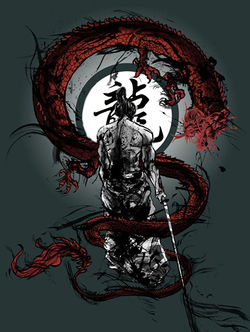
- "Character may almost be called the most effective means of persuasion."
- ―Aristotle (384 - 322 BC)
During this time, my own personal quests for power and knowledge strained me. To be pulled in as many directions as I was could never be sustained. And yet, I was so caught up in my own legend that I truly believed myself capable of all deeds, and infinite glory. Capable I may be. Powerful... perhaps I am. Yet godly I am not. Yet or ever, only time will tell. But for now, godly I am not.
The Dark Council (16 - 18 ABY)
With the end of the War against the so-called "Consciousness," the Dark Council called upon Tarentum to fill a vacancy; the Sith High Warrior, Xanos Sadow, had resigned his post. Sith Bloodfyre was called to lead the Order. During the final days of the War against the Consciousness, Sith had been raised to the level of Elder, attaining status as an Adept of the Sith; shortly after his elevation to Sith High Warrior, Bloodfyre became a Master within the Order, and began to delve into the tomes and holocrons, and all the stored knowledge of the ancient Sith. It seemed that a time of rebirth was slowly coming about.
Serving among the other Order Leaders -- first Shaithis Var'rek as Obelisk High Commander, followed by Korras from Tarentum; as well as Telona Murrage of Tarentum, who had succeeded Alanna as Krath High Priestess -- Sith managed to help evolve the practices of the Brotherhood and the Clans to a noteworthy degree. Jac Cotelin succeeded Firefox as reigning Grand Master, and while Sith had continued to serve as Cotelin's Praetor for a time after being positioned as High Warrior, eventually Bloodfyre and Lord Cotelin recognized a need to retire the Shaevalian from assisting the Grand Master on the same basis. Bloodfyre turned exclusively towards his duties among the Sith.
The Sith Order changed and evolved under the leadership and attention of Sith Bloodfyre, but as always happens, time changed both circumstances and people. For more than a year, Bloodfyre reigned as Sith High Warrior, but chose to resign and return to Tarentum. Bloodfyre's departure from the Dark Council preceded the choice of the Grand Master Cotelin to dissolve the Order Leaders of the Brotherhood. In recognition for his excellent service as Sith High Warrior, Bloodfyre was honored with the Silver Sash; few wear the Sash in these modern days, and it is a great honor to bear.
Information circulated outward from the Dark Council to specific circles that Bloodfyre's departure from the Council was precipitated by a fracture in his relations with the Grand Master. While Sith had previously ingrained himself with Lord Cotelin on numerous occasions, the masters of the Dark Side often come into aggressions toward each other. The exact nature of the dissipated relationship between Sith and Jac has never been revealed, but there remains a certain tenseness that is palpable to all whenever the two are within earshot of each other.
The Madness Returns (18 - 20 ABY)
Tarentum had aligned itself with a mysterious sect of beings rarely spoken of outside of the Clan. However, some information did escape Tarentum that a race of so-called "Keepers" were now in alliance with the lords of Yridia, and that the dark necromantic arts that began to spread throughout the Clan were a boon in recognition of the alliance. Sith's return to Tarentum found him among the sons and daughters of Tridens this time, instead of his previous home of Gladius. Sith was tapped for leadership in the House that guarded the Castle of the great Clan, first as Aedile to JKast and then as succeeding Quaestor. Sith chose the veteran Doni Tzu as Aedile, and the two sought to usher in a new age for Tridens, and for the Clan as a whole. In serving Tridens, it became obvious that Bloodfyre would always be linked to leadership within the Clan.
War came again to the Brotherhood, and this time the Brotherhood would be fractured into opposing factions due to the appearance of two Jac Cotelins. It seemed as though the Grand Master had been cloned for unknown purposes, but at the root of the conflict lay the Lord Hegemon, Kaiann. Tarentum initially refused to take sides in the conflict, seeing it as a dispute among the Dark Council for its own life and leadership, but as with almost every conflict of the Dark Council, the Clans were swept up into the chaos. The two Jacs fought for control of the Brotherhood, with a portion of the Council and Clans following each supposed Grand Master. The end of the War is shrouded in mystery; neither of the Jacs was ever verified to be the real or the clone Grand Master, but after a fight between the two, one Jac emerged, and the Council and most of the Clans were willing to see this figure as the "true" Jac Cotelin. The conflict had ended.
Rumors of treachery ensued as the respected Warlord Welshman Corsair, the reigning Consul of the Clan, retired from the position and bestowed the position upon Sith Bloodfyre, rather than his Proconsul Telona Murrage, as was generally custom in the Clan. Telona did not serve Bloodfyre as aide long, and retired from leadership. Sith chose the infamous and aggressive Maxamillian von Oberst as his Proconsul, when others thought Sith might return his former Proconsul, Rekio Corsair, to the station.
The duo of Bloodfyre and Oberst became rather notorious among the other Clans and the Dark Council as a whole. Initially, it was thought that the presence of Sith Bloodfyre as Consul would reaffirm the relations between Tarentum and the Dark Council, as had happened during Bloodfyre's previous term. There was a short quiet that was brought in, but hopes for a continued peace between Tarentum and the Council could not last. It was suggested that the fallen Sith High Warrior may have been touched by a bit of the madness that had infected the Brotherhood, and was not entirely healed of the Consciousness. Others suggested that the fire of the Dark Side was destroying the Shaevalian from within, and that the man was likely to eradicate all of Tarentum with him if given the opportunity. Within the Clan, however, the Tarenti believed in the powers and leadership of the Shaevalian, and expected a return to the "golden age" of his previous term as Consul.
The Fallen
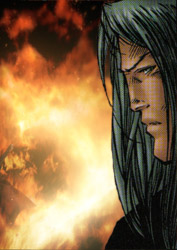
- "All speech is vain and empty unless it be accompanied by action."
- ―Demosthenes (384 - 322 BC)
And though I could fall no further, I seemed all too willing to wallow in my own depths of mediocrity and helplessness. I blamed others for my failures. In truth, I simply did not wish to rise up. I did not wish to ascend. I did not wish to be glorified. I think I simply wished to be angry. The Dark Side wished me to be impotent. And though I had learned such a lesson many times, I realized here that if I was not always the master of the Force, the lord of the Dark Side, and the will behind the abilities of the Sith, I would always be the pawn.
I am the lord. I am the master. I am the potent will that devours worlds. I am now, and shall always be Sith Bloodfyre, Master of the Sith Order.
The Dark Times (20 - 22 ABY)
As Tarentum and the Brotherhood as a whole entered and then ended the period referred to as "Second Darkness," a conflict of training and testing for the Clans and the Brotherhood, Antei found itself under assault by strange aliens. At the end of the "Second Darkness," as the ceremony of celebration to honor the victors commenced, the Brotherhood fleets came under attack from these strange beings without warning. The initial attack came suddenly, and many Brotherhood ships fell victim to the alien intruders. It seemed that only Tarentum was able to defend itself adequately, as none of the Clan's ships took any serious damage.
The assault from the aliens lasted a mere six days, but in that short week, many of the Brotherhood fell wounded, or were slain. The invaders pursued the Brotherhood ships from outside of the Shroud back to Antei itself, where the final defeat of the Brotherhood forces seemed assured. This complete disaster was narrowly averted by the sacrifice of Grand Master Sarin's own flagship, the Autarch, though Sarin himself was not on board the vessel at the time of its destruction. The Brotherhood forces fled, and because of the heavy losses the invading aliens suffered in the sacrifice of the Autarch, the intruders let the Brotherhood forces flee. Antei was now under control of outlanders, and the Brotherhood was now an order without a home; the Dark Council now a leadership in exile.
Tarentum returned home to Yridia, but her Consul was soon called away to meet in private with the wandering Dark Council. Each of the Clans' Consuls met with the entirety of the Council, and was informed of a new fleet of Brotherhood ships, and a new directive from Grand Master Sarin to ensure the survival of the Brotherhood: go underground. Each Clan was directed to move itself out of the public eye, and to seek deeper into themselves to discover new strength and power that would ensure the survival of the Brotherhood. After the days-long meeting with the Council, each Consul left with a new fleet of ships in tow, new additions to their forces to bolster the fists of the Clans.
Bloodfyre returned to Yridia with the Clan's new fleet, leading the procession from the Clan's Imperial-class Star Destroyer, which would soon be named in honor of House Tarentum's Founder and first Quaestor, Magnus Kaerner. The first action that the Magnus Kaerner would see was a rescue operation over the moon Koros, that ended up being the final battleground and resting place of the Tarentum's long-time flagship, the Victory-class Star Destroyer Corsair. With the destruction of the Cestus Complex, and the eradication of most of the Cestus undead, the third House of Tarentum was reborn under the direction of the Shaevalian Consul.
The praised times of the first reign of the former High Warrior would not return, however, and hostilities between Bloodfyre and the Council, primarily between the Shaevalian and the Grand Master, came to a climax. Sith had come to despise the entirety of the Council because of its devoted allegiance to Jac Cotelin, an allegiance that had once been strongest in the Shaevalian himself. Even though Sarin now reigned as Grand Master, Bloodfyre felt as though Lord Cotelin was secretly manipulating circumstances, and acting against the Shaevalian due to the heightened tension between the two. Sith cursed the Grand Master and his subordinates, and resigned his position as Consul of Tarentum once more. In his stead, Anshar Kahn, who had been serving as the Headmaster of the Shadow Academy, answered the call of the Grand Master to try and restore the power and stability of the Clan in Yridia.
Tensions continued within the Clan for a short time, however, as Anshar had to fight with the personality of Oberst, whom Anshar had chosen to continue to serve as Proconsul to assist with restoring stability in Yridia. The two would work out their own differences, though, and the storm that had erupted with Bloodfyre was soon settled, and Tarentum looked to rebuild. In the shadows, however, Tarentum could not understand the enemy that lay beneath the waves, an enemy that the Clan had welcomed in as friends and allies.
Rebirth Among The Tarenti (22 ABY)
While Anshar and Oberst settled into an alliance and worked to restore Tarentum's stability once more, Sith Bloodfyre began to recede away from the daily activities of the Clan and its Houses. Sith numbered himself among those who had reformed the lost House of Cestus, and secluded himself on Koros. Though Bloodfyre was generally willing to interact with those of his House, the days when the Shaevalian was a regular visitor to all Houses and functions of Tarentum seemed long since past.
As Cestus rebuilt, however, the Clan found a not-entirely-unfamiliar ghost out of Oberst's past to keep it occupied. The ghost appeared as the Renegade, a ship that had once been utilized by the Infiltrator Wing, a portion of the former Emperor's Hammer that Maxamillian von Oberst had once served as both IWXO and IWCOM, the top two positions of the Wing. The incident has not been spoken of outside of Tarentum, though the presence of the Renegade was reported by several passersby to the Yridia system. For quite some time, the old ship was noted among the fleet of Tarentum, but its disappearance recently has been noted. Tarentum has not divulged anything regarding the ship's appearance or subsequent disappearance at all. Whether or not the Shaevalian may have been involved with the events surrounding the Renegade is up for debate.
As Tarentum moved on, Sith turned farther into his own pursuits and his own darkness. Though the final rebirth of the Shaevalian was still some distance off, it became readily apparent that the Dark Side was either testing the Sith Master, or attempting to undo him. And while there is certainly power within the Dark Side, Sith had always stated that he was the master, and not the pawn; that it was Bloodfyre himself who commanded, and the Dark Side of the Force that served his will. Sith sank deeper into himself, and into his own pursuits as he sought to negate the effects of the Dark Side asserting itself, and return the power of his own will to ascension.
As Tarentum continued to come out of its shell during the reign of Anshar, followed by that of Oberst, the Clan evolved. Cestus, Gladius and Tridens were swept away in change, and replaced by new Houses that honored first the founder of the House that became Tarentum, Magnus Kaerner, and one of the greats of the first days, Erich von Reinthaler. The rebirth of the Houses brought with them added productivity to the members in general, and an optimism that had been sorely needed in the Clan. The reign of Oberst was considered to be successful and stable, which evolved into the reign of the hound's Proconsul, Ronovi Tavisaen.
The Shade
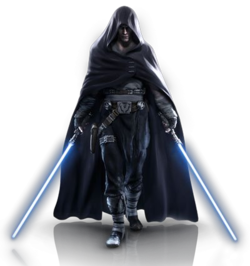
- "Character is like a tree and reputation like a shadow. The shadow is what we think of it; the tree is the real thing."
- ―Abraham Lincoln (1809 - 1865 AD)
It is entirely possible that my own existence is linked with Tarentum, as the two seem to mimic each other. Or, perhaps the greater truth is, my powers wax and wane according to the strength and health of my kin. I had seen such deceit and betrayal among my own kind -- from my own father -- that I had denied the power that binding relationships can have upon us.
If Tarentum is strong, then the Ghost Dragon may be godlike. If the Clan is weak, then Death itself is impotent. I am bound to it for eternity.
The Old Rites Reborn (23 ABY)
Sith was tapped for a short time to serve as the Combat Master of the Antei Combat Center. However, many of the harpies that surrounded the Grand Master bickered about the choice of the Ghost Dragon as Combat Master, and turned their flocks away from the Center. As such, the decision was made between the Grand Master and the Shaevalian, and Sith returned to Tarentum.
As the evolution of the Clan continued, the Brotherhood began to devolve. Everything was changing, and moving towards the old. Numbers among those who followed the Dark Side dwindled due to attrition in war, and the inability of recent initiates to properly control the Force. Not long after Sarin gave up the Iron Throne in favor of Muz Ashen, the new Grand Master decreed that all the Houses that had once Clanned would become Houses once again. Clan Tarentum became House Tarentum anew, as did every other facet of the Brotherhood. Some saw it as a defeat and an insult to the honor and pride of every Clan-become-House; Sith Bloodfyre did not.
The Shaevalian moved to take advantage of the closeness and unity that Muz sought to reinforce in striking down the grandeur of the Clans that had been heaped upon the masses. With the knowledge of the ancient Sith that had been hoarded by the fallen Sith High Warrior in the days before the Order Leaders were done away with, Sith began to research the so-called "Rite of Sin." After months of preparation, and calls placed throughout the Force, a new sect was gathered of the worthy and elite, and the ritual was enacted.
In Tarentum itself, very little was known about those who were called "Sinners." Outside of the House, next-to-nothing was known about what was called the "Cult of Bloodfyre." The Shaevalian himself was often referred to as the "First Sinner," but there is little evidence to suggest that this title is an official one, or used inside of Tarentum or the cult itself. Whether intended as some permanent circle or not, the Rite apparently failed, and the circle was broken. The Sith Master fled Yridia, perhaps, or simply disappeared into the depths of the Asylum; no one is entirely certain. The currents of the Brotherhood moved along, and swept history away with it. Bloodfyre would not return until the situation had changed, and drastically so.
On Death's Door (24 - 34 ABY)
By time the Shaevalian either felt the call, or someone sought to draw him back to the here and now in the Brotherhood, the Jedi had made appearances. There was a person known as Omancor Crask or Darth Carnus on Antei, and then a new iteration of Jedi upon a world that was to be known as New Tython. The Brotherhood seemed to ride the tides of these storms well, but Tarentum continued to suffer. Though there were faithful to the banner of Tarentum as always, they seemed to be fewer in number. As Tarentum itself seemed to wane, so too did the days of Muz Ashen's reign on the Iron Throne draw to a close. Ascending the Iron Throne was a Sith Lord hailed as Darth Pravus, who was said to be the murderer of the former Grand Master Sarin.
Pravus made the curious move to raise all the Independent Houses to Clan status once more, though a few had previously attained that status under different means. At the end of this change in House to Clans, Tarentum itself was changed: Scion Altera and Hades were removed as Summit, replaced by a former Tarenti, Raiju Kang, and Korras Tarentae, who was now being hailed as Darth Aeternus and was possessed of a noticeable darkness and ferocity that the former Obelisk High Commander and former Master-at-Arms had never before exhibited. As the change in leadership occurred, a renewed vigor came among much of Tarentum, including a return of Bloodfyre. The Sith Master emerged from the bowels of the Asylum that had been his home among the Mystics a darker individual, and all things in the Clan of Death shifted.
The Risen
- "The Hell's Angels try not to do anything halfway, and anyone who deals in extremes is bound to cause trouble, whether he means to or not. This, along with a belief in total retaliation for any offense or insult, is what makes the Hell's Angels unmanageable for the police and morbidly fascinating to the general public."
- ―Hunter S. Thompson (1937 - 2005 AD)
Perhaps Raiju Kang had the credit to buy Tarentum a new lease on life that could not be paid by others. Yet, for all his promise, he abandoned us once again. And perhaps therein was his actual gift to us -- by leaving once more, real strength began to grow in the Clan of Death once again. A growing body of Clansmen who walk their own path had sprung up, and the Grey Wolves and their kind remind us that Tarentum always walks its own path, and controls its own destiny.
Farrin Xies rose to the head of our Clan, and the Brotherhood would remember the value of the Clan of Life and Death. It appeared a new golden age of Tarentum might emerge.
Reanimation
Death is cerebral.
The Ghost Dragon haunts my dreams.
My hands bathed in blood.
Character Information
Appearance
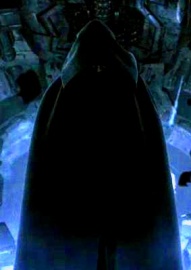
Standing at 1.85 meters and weighing 108 kilos, Sith is not the largest member of Tarentum, but he is certainly one of the more imposing members of the Clan. The Shaevalian has long, flowing black hair and cold, light blue eyes. His skin has a mild tan to it, and is nearly unmarked -- save a great many scars just above his left elbow. The scarring appears several inches above the elbow, and ends a few inches lower (just above his elbow). The scarring serves as a very visible sign of where his arm was hacked off in combat as a younger man, and replaced by a cybernetic implant, and then in later years by cloned tissue.
Also, both forearms bear banded tattoos -- three rings of text that circle both forearms in an alien dialect; if anyone other than the Shaevalian understands what the bands read, none have revealed the translation. Several other tattoos adorn the body of the Sith Master, though only close friends have likely seen him disrobed to the point of viewing them.
Very little of Sith's physical appearance is actually viewed by the general public. Sith is almost always fully-clothed in his regular clothes and black robes, the hood pulled up over his head, pulled down low over his eyes. The most that the average person will see of Sith is his nose, mouth, chin and neck, as well as his hands. His mouth is almost always void of any sign of emotion, except for infrequent grins that have nothing but contempt and disdain for those who view it. His hands are soft and strong, in some ways almost strangely inviting, as if begging to be touched. Sith's body, though not as large as others in Tarentum (such as Oberst), still conveys a feeling of strength. His form is generally toned, and outward perception is that he has an athletic build.
Apparel
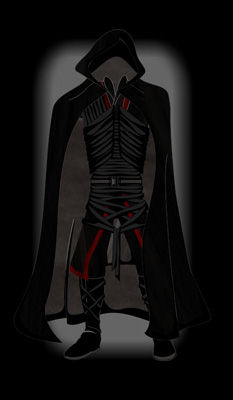
Sith is a rather solitary individual, and this even shows through in his attire. His robes consist of a matte black outer robe with a hood, which is almost always pulled down low over his face, and reveals only his chin, mouth, and perhaps the tip of his nose. The robes are very simple in creation, and act more to hide the Sith Master from the world than to provide other benefit. However, within the inner folds of the outer robe, Sith does have some hidden pockets that may be utilized to hide small items, about the size of anything that could reasonably be palmed. Items that might be utilized within these pockets would be ID cards, small packets, and other minor baubles.
The inner robes, or combat gear worn by the Sith Master are also simple, but very useful for his needs. Bloodfyre is most often seen in combat gear that is a form-fitting, mostly matte black suit with possible additions depending on his present objectives or missions. Sith wears a black, airtight body glove underneath his robes that is insulated, and with the addition of a sealed helmet, would protect him for a short while if forced into a vacuum situation (i.e. space). The body glove is also for protection against extreme cold, and may also be utilized to disguise the Sith Master's body heat from thermal imaging equipment.
Over the body glove, Sith wears a much-similar form-fitting garment that has a distinct colored pattern that is designed to help break up his silhouette (if he disrobes to this layer of robes). The garment itself is main of a plain material, and offers little more than cosmetic covering for the Sith Master. Over this secondary garment is a robe top that is sleeveless, and is much like any other black fold-over robe top, with some red trim.
Physical Items of Note
- Eyes: Sith's eyes are extremely light-sensitive; any level of light above candle light conditions tend to cause him discomfort, with the level of discomfort increasing with the intensity of the light conditions. Bright, noonday light can actually cause him extreme distress, to the point of being blinded and overcome by the pain. To this end, Sith almost always wears his hood pulled up and low over his eyes, even at night. Sith has not, and does not reveal this to anyone with the exception of his closest allies. (Read: this is not general knowledge available to the Dark Brotherhood as a whole.) Whether this light sensitivity is caused due to the hue of his eyes, or some other physical attribute or ailment is unknown. When there is any possibility that Sith’s eyes may be exposed to light, the Shaevalian actually wears a blindfold or veil to protect himself. How he sees is questionable -- though it is likely through the Force, if not through the use of his other senses.
- Left arm: Sith's left arm was hacked off, just above the elbow, at an early age. The specific details of the incident are scarcely known outside of Tarentum. It is known, though, that his arm was replaced by a cybernetic implant at one point, but has since been replaced once more by a natural cloned limb by the scientists at Arkanian Micro. The arm was grown from samples of his own tissue, and has all the abilities of any natural limb. Any x-rays taken of the limb, though, can clearly show that the bone looks surgically attached above the elbow. In addition, the scars Sith has always had still remain; he chose not to have them surgically cleared.
Personality and Traits
Above all else, Sith is driven by two main things: the power of Tarentum, and mastery among the Sith. In these two pursuits, he will give everything, devote anything, and sacrifice himself if needed to assure either, and in that order. In all things, Tarentum comes first. When among the Tarenti, Sith is focused, supremely in control, and exudes complete confidence. In his eyes, all things are possible with the Clan of Life and Death. Beyond that, Sith is motivated to ensure Tarentum's victory and success, and he will exert every effort to motivate the rest of his Clan.
It is worth noting that Sith considers Tarentum his Clan. While others may lead, and the Clan as a whole is bound as kin, he is entirely protective of Tarentum as though it is his personal property, and will get violent in its defense.
At most times, Sith is cold and calculating, yet beneath the surface, he is a raging cauldron. Such violent emotions boil beneath the surface of his very manicured facade. There is very little that is capable of making him lose his cool. He may comment about always being very near a breaking point, very near unleashing his full powers upon his foes. This is perhaps the greatest source of his power -- his limitless rage. He doesn't generally speak of the source of his anger, though rumor does suggest it likely has to do with his people, or his father. Any questions regarding his people or his family are met with icy stares and dismissive gestures at best.
Where Sith walks, most hear his foot steps; they are most often slow and even, almost like the measured footsteps of a stalking predator. His presence is always felt before it is seen. Those who know him and are accustomed to his presence generally know when he is approaching, when he is near, and (consequently) when he is not near. Those who can feel his presence often notice it as a warming sensation; perhaps it is their own mind that convinces them that his name has mystical properties and effects to it. The closer he gets, though, and that warmth becomes overpowering, worrisome, and constricting, to the point where his close proximity will cause tension, great anxiety and terror. Very few individuals can stand to be within several meters of the Shaevalian if he does not wish it, and will require great resolve to remain in his presence,
Sith's voice is rather cold and unfeeling. He has a strong, audible voice that can be heard for several meters even at a whisper. His voice is mildly deep, but has a sense of strength to it as well. Though there is rarely emotion in his words, Tarentum's members often find comfort and courage whenever he speaks. When he does speak, he often carries his words as though he sees and understands the future, and disbelieves that failure is an option for the Clan of both Life and Death. The Shaevalian is generally straight forward in his words, and rarely does he wax cryptic or poetic, though it has happened on occasion.
On those rare occasions when Sith has raised his voice, only one word can aptly describe his tone -- thunderous.
The Ghost Dragon, Death
It is worth noting that, in coming into the world, Sith became Death; his life began by ending his own mother. Throughout his personal history, he has seen death and destruction surround him. Then, after finding himself under the direction of Chi Long, Sith realized that, more than being surrounded by death, any who came in contact with him were consumed by death, and actually fueled a rise to his own greater power. The Fire Dragon opened his eyes to a truth that the entire universe would seek to keep hidden -- Sith Bloodfyre was a living embodiment of Death, the very part of the Force that consumed all life.
Unlike some of the other Dragons, Sith does not believe he is possessed by another entity or spirit that is named Death, or that he is a reincarnated version of such a being. However, he does see himself as a portion of Death, that facet of the Force given a mortal form. There is no split in personality or otherwise -- there is only he who is sometimes called Gwei Long, the Ghost Dragon, the living embodiment of Death.
And his name is Sith Bloodfyre.
Powers and Abilities

- "It is weakness rather than wickedness which renders men unfit to be trusted with unlimited power."
- ―John Adams (1735 - 1826 AD)
The ancient Sith Empire was divided into castes, separating those with power and placing them above those without it. These castes were brought into Sith society by the very Dark Jedi who subjugated them and became the first Dark Lords of the Sith. Among these castes were laborers, masons, manufacturers, hunters and more. At the top of the caste system were the Dark Lords and their chosen servants -- these were the Warriors, the Sorcerers, and all those gifted of the Dark Side of the Force and Sith Magic.
The Sith Warriors were powerful soldiers and weapons of war. They possessed powers of the Dark Side and Sith Magic, but tended to use these powers sparingly, and instead chose to dominate their enemies with their physical prowess. The Sith Sorcerers, however, were those who focused their might through the darker powers, and were able to create powerful storms through the Force, able to call mighty strokes of lightning from their fingers tips or balls of flame from their hands, and much, much more. The Sith Sorcerers were a mysterious sect, one that kept secrets even from the Dark Lord and his Council of Sith Lords. Only the Sith Alchemists were even more mysterious than the Sorcerers.
In the modern era, most Sith practiced the teachings of Darth Bane and his hermetic Rule of Two. Some Sith seek to keep their power to themselves, and find another to seek after their knowledge. Sith Bloodfyre is different.
During his initial training in the Brotherhood, Bloodfyre became almost obsessed with the ancient Sith. As his experience and powers grew, so did his quest to uncover the secrets of the Sith (even though he was Krath at the time). Time went on, and though the Dark Side powers grew with study, his hunger was never abated. Sith soon went to train with the Obelisk. Within the sect of fanatical warriors, Sith learned a great deal about combat and martial prowess, and still his desire for more was not quelled. Bloodfyre became a member of the Sith Order, and found his true calling. When the time came for him to ascend to the position of Sith High Warrior, all of the secrets of the Order were opened unto him. And there, Sith found dark powers, indeed. The knowledge of the ancient Sith was laid out before him, and powers unknown to any except the High Warriors before him and the Dark Lord increased his skills and abilities exponentially. And then Bloodfyre had an epiphany of sorts.
As his friend and ally, Maxamillian von Oberst has often said, armies need generals at their heads, not warlocks. With the powers opened unto him, the Shaevalian realized their true potency lay not in using them at every opportunity and showing the universe the extent of his powers, but by keeping them shrouded in mystery and rumor, and letting his enemies be defeated by their own imaginations. Sith's views on the Force changed in that instant.
Sith Bloodfyre is a minimalist in his view of the Force. Though the powers of the Dark Side are opened completely unto him, he does not use the majority of his powers often at all. He prefers to use his physical strengths, sometimes enhanced by the Dark Side, to show his enemies that he is a warrior without peer, and that his skills with any manner of weapon are unmatched. When Sith does use the Force, it tends to be very subtle, or is outright vulgar in existence, calling forth Sith lightning and other dread abilities. When it comes to Force powers, Sith Bloodfyre is almost unstoppable.
There is one sort of weakness in Bloodfyre when it comes to the Force. Sith is an extremely strong-willed person, and very few individuals have ever shown the ability to bend him to their will; the only person ever known to bend Sith Bloodfyre to his will was Grand Master Jac Cotelin, and even then, it was a difficult feat for the Grand Master. As such, mental powers through the Force will not work on the Shaevalian by those of equal or lesser rank. Only those of substantially greater power have any potential to manipulate his will. In addition, perhaps due to this immense willpower and resistance to mental powers, Sith is unable to use many of the Dark Side's mental powers. Bloodfyre finds it difficult to read the minds of others or communicate with them through telepathy. Only those powers that rely on Sith imposing his will on others have any chance of succeeding.
Sith was also considered one of the foremost Masters of Tarentum's brand of Necromancy, and was considered one of the few members of Tarentum who knew perhaps all of the secrets available to the Clan of Life and Death. With the rather strange disappearance of Tarentum's Necromantic powers, and a movement towards utilizing smoke and demonic powers, as well as the ability to create the dreaded Rakghoul, it seems rather strange that Bloodfyre has not hoarded the knowledge of these powers, and learned to utilize them to their fullest extent. It is whispered that the Shaevalian has shunned these powers entirely, and may still be seeking after the darker arts.
Combat
Sith Bloodfyre is generally a warrior first and a sorcerer second. In combat situations, he prefers to mount both an offense and defense primarily with his lightsaber and other weapons before using the Force. However. As one of the foremost powers of Tarentum, he often allows allies like Darth Aeternus to engage at the front lines while he utilizes Battle Meditation or other powers to ensure victory. Sith does not generally speak at length when involved in combat, and is blunt and direct when he does speak. Unless he is shouting commands out to his Clanmates or otherwise, he is an almost eerily silent opponent. Some of those who have faced him have remarked that it was somewhat unnerving to fight someone "as quiet as the grave."
Of note -- Bloodfyre does not generally kill his opponents, unless he considers them a true enemy. Except for those who will not surrender and must be culled, the only members of the Brotherhood he would execute would be the blood hunted of the Longs, as well as Arania and Kaiann.
Lightsaber Combat
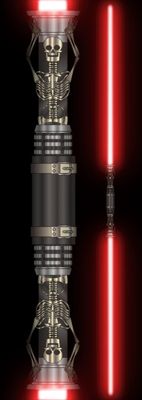
Sith's weapon of choice is the lightsaber, and has been for some time throughout his Brotherhood career.
At present, the Sith Master primarily utilizes a custom double-bladed lightsaber called the Deathsaber. The double-bladed weapon that Sith carries was a gift from Grand Master Muz Ashen, before Muz had attained that vaunted position. This lightsaber is a rather morbid-looking collection of miniature skeletons and black metals, all that draw upon the Sith Master's reputation as one of the darker Necromancers of Tarentum. The Shaevalian also has a mixture of custom, single-bladed lightsabers that looks surprisingly benign. All of his lightsabers have dual phase settings, and can increase or decrease both length and density at the press of the button in combat.
Sith had studied many forms of lightsaber combat throughout the years. His initial choice of form was Shii-Cho. Though certainly ancient and studied widely, the form offers very simple, yet powerful offense and defense to the wielder. It is said that one of Shii-Cho's greatest boons to its wielders is the simplicity. In anticipating strikes and preparing for them, other lightsaber-wielding warriors may often be misled by how simple and straightforward the attack is coming from one who utilizes Shii-Cho. As Bloodfyre is blunt and straightforward, this attack style suits him. Though other forms are available to him, while he is wielding a single-bladed weapon, he often reverts to this form simply to catch his opponents off guard, and to shake the situation more to his favor.
While Shii-Co is the Shaevalian's preferred form for single-bladed or double-bladed combat, there is much to be offered in the way of Shien. Shien stylings also help switch from quick, incredible defense to offensive velocities, and is the Sith Master's form of choice when he utilizes both blades of his infamous Deathsaber. The benefit of being a master of both Shii-Cho and Shien affords the Shaevalian a great boon in being able to wield a single lightsaber, dual lightsabers, or his double-bladed lightsaber at any given time.
Miscellaneous Combat
Sith has studied Hapan Boxing, as well as various grappling forms including Paonga. Though he prefers to remain on his feet where he can make the greatest use of his fighting techniques combined with lightsaber skill and Force powers, he is quite competent should the fight go to the ground. He prefers choke holds in ground situations, generally those that make use of either his own clothing, or the clothing of his opponent. As such, the sleeves on his clothes are reinforced to withstand the strain from being used in choking situations. The other edges of his robes have also been reinforced to withstand the strain of chokes and other techniques that would tear most fabrics.
Special Notes
The Deathsworn
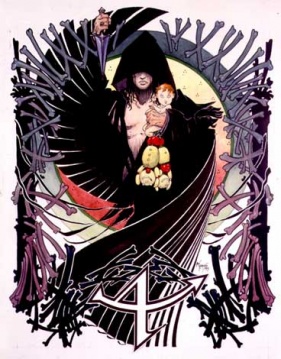
- "Think not disdainfully of death, but look on it with favor; for even death is one of the things that Nature wills."
- ―Marcus Aurelius Antoninus (121 - 180 AD)
A cult has arisen around the powers of the Sith Master of Tarentum. Calling themselves the Deathsworn, these nihilistic members of Mortis and Tarentum are obsessed with death, and expanding the dark arts through grim and macabre means. At present, only sparse rumors of this gathering exist outside of Tarentum, but information continues to gather and grow.
Within Tarentum, the Deathsworn are known to be murderous, and bent on inflicting suffering on all of their victims. They believe that causing wounds upon the Force through dark, genocidal acts will not only strengthen the Dark Side, but will also prevent the Force from feeding on them and eating away at their own powers. In this manner, they will grow by being a blight upon other parts of existence.
The Deathsworn follow after the beliefs and teachings of the Sith Master, though they are generally lead by the so-called Vicar of Death, Etah d’Tana, a close ally of Bloodfyre's.
The Dragons
The Long family are, outside of Tarentum, perhaps the closest allies Sith is known to have. While his ultimate loyalty resides with his Clan, there has never become a situation that would put the two at odds. Sith is one of the eldest remaining Dragons, and there is a certain code of conduct or loyalty that all of the Longs abide by. As one of the few remaining apprentices of the Fire Dragon (Cyris Oscura, the Black Dragon Hei Long being the other) still active within the Brotherhood, Sith certainly holds a place of honor among the family. Yet, when he was the eldest remaining member (after the disappearance of Trevarus Caerick), Sith did not seek leadership of the family, and supported the claim of Shan Long’s apprentice, Xia Long (sometimes known as Sildrin).
There is no family fortress or family holdings, and the Dragons rarely meet in person, preferring contact over the holonet for such things. However, there is a seamless bond that exists among the Longs that, when forced together for common benefit, creates a deadly fighting force that knows no equal. When gathered as such, Sith generally fills a sorcerer’s role, allowing those like his brother Shi Long -- the accepted family master or bearer of Long Shan Zhi -- to bear blades at the front lines. The Ghost Dragon is more widely known for his mastery of Battle Meditation and other powers that help claim victory in combat scenarios.